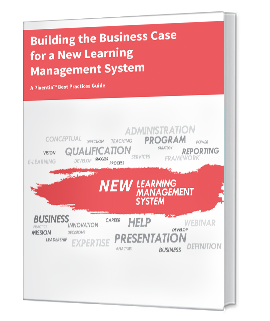
A learning management system is a complex platform with many moving parts. Unless you have the expertise and resources to manage the LMS implementation yourself, you will need an implementation partner.
Finding the right partner requires the same diligence as choosing the right software platform. You will form a relationship that will impact your business. You will also form a long-term relationship that can meet your needs well into the future.
As in all projects, preparation is essential to success.
Prepare the Organization
Let us take a moment to be sure that your essential building blocks are in place. If you follow the Pixentia method, you have:
- aligned your project strategy with your enterprise learning strategy, and the learning strategy with your business strategy,
- assembled a team of experts in business operations, learning, technology, and project management, led by an executive sponsor,
- created a change management and communication plan, and
- agreed on performance objectives for the project and determined the measures you will use to assess the business impact of your efforts.
We recommend you put these things in place before you start the selection process. You can read more about it in this article.
Determine the Scope
With your learning strategy as a guide, establish what you need to accomplish.
- Number of users and locations, and whether you need a distributed content network with multiple server locations
- Mobile, video, and digital strategy
- Integrations with other software platforms such as HRIS and talent management
- Learning activity sourcing: MOOCs, e-learning vendors, specialized providers
Establish Selection Criteria
Develop criteria for selection and stick to them. They will help you make a sound decision, as you will be less swayed by emotion.
We recommend the following four general criteria. You may identify others.
- Experience in the industry. A partner who understands the needs of your business is essential. Knowledge of the vertical relationships is critical if you are considering extending learning to the supply chain and distribution channels. Understanding of the market is helpful, also, as it helps guide the learning programs appropriate for your business.
- Keep in mind that firms in the same industry are not all alike. Your needs may be unique.
- Experience with projects of similar size and scope. A partner out of its depth will be a drag on your project. However, people move around in the industry, and a less experienced firm may hire very experienced people. Take a look behind the logo and ask for individual track records.
- Cost and billing structure. Your LMS vendor should give you a good idea of what can be the typical implementation cost. Be as wary of low bids as you are about high bids. Include billing issues in your discussions with references.
- Cultural fit. The working relationship will have a big impact on your project. Take the time to know your candidates well. You will want to explore how the working relationship will be when it is under stress. There will be challenges, and how your partner handles them will determine how the project goes.
Selection Process
You may have an RFP requirement that will dictate how you proceed from here. If not, these general guidelines should help you through the selection process.
Armed with your scope and your selection criteria, start the search. Get recommendations from your colleagues and contacts. Find out who has successful first-hand experience and get their opinions. Develop a list of potential candidates who meet your experience criteria.
- Visit each company’s website to see how they do business. Their web pages, blogs, and case studies should be easy to understand and not riddled with technical jargon.
- Use screening phone calls to understand how each company will work with you. If they listen to your needs and take a keen interest in your success, keep them on your list. If the first thing they want to do is schedule a demo, you may wish to consider another candidate who doesn’t want to rush you to sign a deal.
- Ask for customer references and contact them.
- Schedule a meeting or a demo for the candidates on your short list. Make sure your evaluation group includes representation from all your stakeholders.
- Ask probing questions about how your proposed partner will handle integration. The best partners will possess complete knowledge of integration methods and how to manage data transfers and imports to and from, from many systems.
- Spend time with each of your candidates outside the demo process. Learn how they think and what their values are. Make sure there is a cultural fit.
- Check financial stability. Ask for references and call them.
The reward for your diligence will be a partnership that serves you well and a learning management system that helps you grow your workforce.
We hope these guidelines are helpful to you. Please use the form below if you would like to comment or ask a question.
Pixentia is a full-service technology company dedicated to helping clients solve business problems, improve the capability of their people, and achieve better results.



